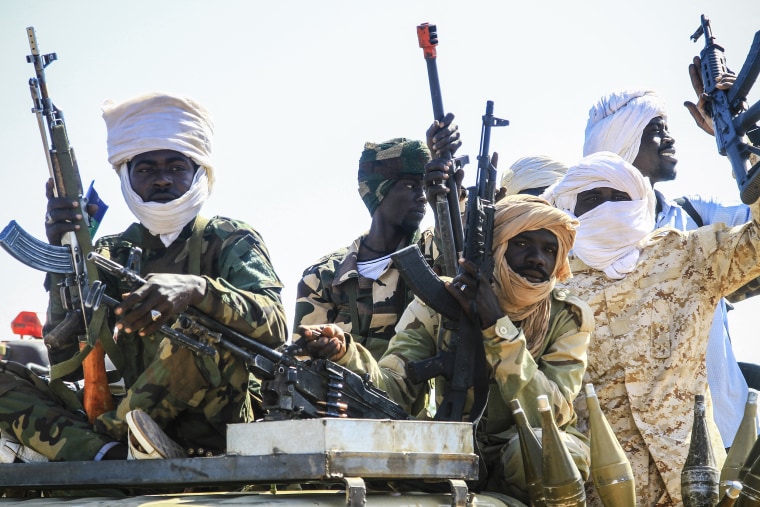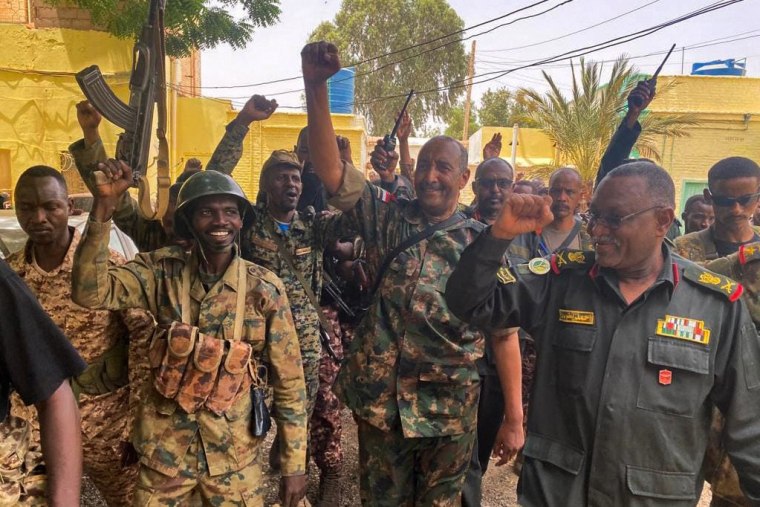Hundreds of towns and villages across Sudan have been burned to the ground, and the fires were likely man-made, satellite images and open-source reporting show — the result of a brutal civil war that has been raging in the northeast African nation for over a year.
Bitter fighting between the forces of two rival generals has laid waste to much of the country, thousands have been slaughtered, and 10 million people have been driven from their homes, creating the world’s largest displacement crisis, according to the United Nations migration agency.
And as the fighting has spread, homes and aid camps have been burned out by fires that have been started intentionally, experts and analysts say.

“When we see reports of fighting coinciding with clusters of fires, it indicates that fire may be being used as a weapon of war,” Mark Snoeck, an open source investigator, told NBC News on Monday.
More than 50 settlements have burned repeatedly, suggesting “intent” and possible forced displacement, added Snoeck, who along with his colleagues has been tracking the blazes by satellite at the Centre for Information Resilience (CIR), a nonprofit organization dedicated to exposing rights abuses and war crimes.
Relying in part on heat-sensing satellites developed by NASA to monitor wildfires around the world, Snoeck and the team of researchers from CIR’s Sudan Witness project have documented more than 235 fires that broke out in towns and villages across the country since the start of the war in April 2023.
Combining this with open source reporting — cross checking social media content, maps and other publicly available data — they are able to determine the scope of the destruction across the country, which sits at the crossroads of sub-Saharan Africa and the Middle East and is home to both African and Arab populations, with Arabic being the most widely spoken language.
CIR found much of the violence was taking place in Darfur, Sudan’s westernmost region. The latest data shows the fire events moving closer and into El Fasher, the capital of Sudan’s North Darfur state and home to 1.5 million people, including many who have fled from other embattled parts of the country. It is also the last major city in Darfur where the military has a presence, and has become the focal point of the latest fighting between the war’s combatants.
Power struggle
The region has become a flashpoint in the war that broke out in April 2023 between the Sudanese military, controlled by the country’s top commander and de facto ruler, Gen. Abdel Fattah Burhan, and his former deputy, Gen. Mohammed Hamdan Dagalo — a former camel dealer widely known as Hemedti — who leads the paramilitary Rapid Support Forces (RSF).
Both men were leaders in a counterinsurgency against an uprising in Sudan’s Darfur region, a conflict that in 2005 saw dictator Omar al-Bashir become the world’s first sitting leader to be indicted by the International Criminal Court on suspicion of genocide. Then they were part of the military establishment that helped oust al-Bashir in 2019 after widespread popular unrest.
Two years later, they agreed to rule together in an alliance that saw the military seize power in a coup following the collapse of the Western-backed government of Prime Minister Abdalla Hamdok in 2021.
But the alliance between the two military leaders spectacularly broke down over how to manage the transition to a civilian government, and with neither seemingly willing to cede power to the other, war broke out.
Since then, at least 15,000 people have been killed, according to a U.N. report in April, which said that around 18 million people are facing acute hunger.
Separately, the International Organization for Migration said this week that 10 million people had been displaced within Sudan, although it noted that the tally included 2.83 million who were driven from their homes by multiple local conflicts before the current war began. More than 2 million other people have been driven abroad, mostly to neighboring Chad, South Sudan and Egypt, the IOM said.
Together, the number of refugees and internally displaced people means that more than a quarter of Sudan’s population of 47 million have been driven from their homes.
The battle for El Fasher
The latest data from CIR shows the fire events moving closer to El Fasher.
Snoeck says the pattern of fires around El Fasher has coincided with an offensive to encircle the city by Dagalo’s RSF and allied militias.
One video posted on a pro-RSF Telegram channel geolocated by CIR and reviewed by NBC News shows burning homes in an area in the southeast of El Fasher. Recorded between April 28 and 29, it shows armed men in RSF uniforms celebrating in front of the destruction.
Inside the city, “there is no food in the markets, no access to health care, no access to nutrition centers,” said Dr. Gillian Burkhardt, an American obstetrician-gynecologist who completed a two-month stint at a hospital in El Fasher at the end of April working with Médecins Sans Frontières (MSF), the international aid organization also known as Doctors Without Borders.
Her husband, Paul Clarke, an MSF logistics team leader who left El Fasher last month, said moving humanitarian supplies into the city is immensely difficult.
Because it has no functioning airports, Clarke said, semitrucks filled with ready-made meals from neighboring Chad take a month to reach the city.“That’s the best-case scenario,” he said, adding that the supplies were a “drop in the ocean,” compared to the overall need.
MSF said last week that all activities at the city’s South Hospital were suspended after RSF soldiers looted the facility and stole an ambulance.
Janjaweed roots
The RSF is a successor to the Janjaweed, an Arab militia backed by the Sudanese government that the U.N. accused of perpetrating ethnic cleansing in Darfur between 2003 and 2005.
Its senior leaders are still being prosecuted decades later in the International Criminal Court on charges of genocide and war crimes against rebel groups in Darfur, which were fighting against what they said was government oppression against the non-Arab population and later ethnic cleansing against Black African villagers.
The “DNA” of the conflict in Darfur of 20 years ago is still present in the fighting today, according to Omer Ismail, who served as acting foreign minister in Sudan’s transitional government before the military coup.
But he cautioned that “this war is more ferocious.”

“The atrocities that were committed in this war, it is unlike anything that Sudan has seen before,” said Ismail, who now works as a researcher for the Yale Humanitarian Research Lab at the university’s School of Public Health.
His comments came after a report from the lab earlier this month concluded that the RSF has been “systematically destroying civilian dwellings” in areas that have a significant population of Zaghawa, an ethnic minority in Darfur.
The report says “this represents the first specific evidence of potentially ethnically motivated alleged targeting inside El Fasher by RSF.”
Reports this year from the U.N. Panel of Experts on Sudan and Human Rights Watch have also accused RSF soldiers and allied militias of targeting the minority Masalit community during fighting last year in West Darfur. The reports included evidence of systematic executions and widespread sexual violence.
Ismail, 65, who was born in El Fasher, said members of his own family have been displaced from the city by the recent fighting.
If ethnically motivated clashes are happening, he added, “a lot of people are going to die, unfortunately, because there are a lot of civilians in El Fasher and the villages surrounding.”
While most analysts and observers say the RSF bears the most responsibility for the targeting and killing of ethnic minorities in Darfur, the military has nonetheless come in for criticism.
In a statement following a U.N. Security Council meeting on Sudan last month, U.S. Ambassador Linda Thomas-Greenfield accused the Sudanese Armed Forces of systematically obstructing “lifesaving aid, starving millions of innocent civilians caught in the middle of this war.”
International response
International efforts to stop the fighting in Sudan have been severely limited.
The U.S. has been urging both sides to engage in cease-fire talks, and it has placed numerous individuals and companies supporting both sides under sanctions.
On Thursday, the Security Council passed a resolution demanding a cessation of hostilities on all sides and calling for the RSF to end the siege of El Fasher.

International Criminal Court Prosecutor Karim Khan announced in a video message Tuesday that he was launching a new campaign to gather evidence of atrocities currently being committed in Darfur.
“I am extremely concerned about allegations of widespread international crimes being committed in El Fasher and its surrounding areas as I speak,” he said without specifying whom he was investigating.
The Sudanese government, the military and the RSF have not responded to NBC News’ requests for comment.
As battles continue to rage across the country, including in the country’s capital of Khartoum, the fighting shows little sign of abating.
Ismail was nonetheless hopeful for his home nation.
“I’m sure Sudan will come out of this,” he said. “I just hope that these dark days will be short, this war will end soon, and that the world will help us.”
